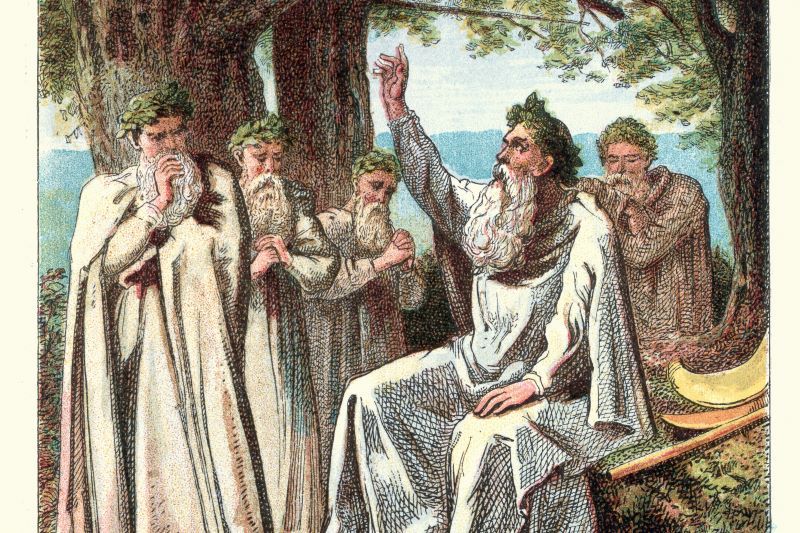Possible origins of the word Druid can mean sorcerer or seer in Old Welsh or Irish respectively. Another possible etymology is a proto-Celtic for “Oak-knower”. The word is first used by the Romans as far back as 400BC to mean a priest caste seen among the celts of the British Isles. They were understood to be exempt from military service or taxes and served a function as judges in courtrooms, priests in religious services, and they organized or oversaw sacrifices. They had the power to excommunicate someone and make them a social outcast. They were respected enough that they could enter untouched onto the battlefield, stop battles and bring about negotiation between armies.

Cesar writes about the druids burning human sacrifices alive in “wicker-men”, large effigies of a person constructed from wicker. He notes that criminals were the preferred sacrifices, but in their absence innocents could be used. A 10th-century document suggests that Gaul deities such as Teutatis, Esus and Taranis were often to receive human sacrifices in three different ways hanged, burnt, and drowned. While there is little physical evidence to prove this in some areas where Druids were reported to operate in Cheshire, some bogs provided the perfect environment to preserve human remains and some victims of possible human sacrifice have been found dating to the first century. Animals could be used and the druids could foretell future events from the calls and movements of birds and how their entrails fell during the sacrifice, but for important matters a human sacrifice was necessary. While burial grounds for many corpses have been found leading some to suggest that it was a place of sacrifice, it might be a mausoleum for an entire army who died with similar wounds from fighting similar tribes. Some historians criticize the Graeco-roman authors. They suggest that this form of barbarism was not true, but was written intended as propaganda to demonstrate the superiority of the Graeco-Roman way of life over other cultures. However, Emperor Tiberius felt the need to pass legislation to reduce human sacrifice so it is evident that the Romans believed their own comments whether or not it was propaganda.
A philosopher called Alexander Cornelius Polyhistor records that, like the Pythagoreans, the druids believe in reincarnation. Cesar comments that this belief robs the celts of their fear of death making them formidable. They are said to teach astronomy, geography, and some natural philosophy, but unfortunately, because druids were essentially illiterate they provide no insight into their own opinion of their practices and there is no record of what the content of their teachings.
Druids appear in folklore as advisors of kings and devotees of old gods such as the Tuatha De Danann (Old Irish deities). When ignored, their prophetic warnings often come true. As enemies, they can often raise storms, but our heroes can overcome these by singing songs that raise the spirit of Ireland. Often literature features them turning people into animals and causing crops to fail.
Druids were essentially extinct by 700AD and they left no autographical writing to judge them by.
In the 17th century, Stonehenge was incorrectly credited to Druid construction. Despite the inaccuracy of the history, the idea stuck and many Druid revivalists attend there for worship services around solstices and equinoxes. Stonehenge likely predates any Druid culture by about 2000 years.

The Ancient Druid Order was formed in 1909 though it claims to have been around much earlier there is no evidence of claimed existence. One of its earliest meeting places was the Kings Arms in Soho. William Blake was posthumously made a member due to his poetry about druids. The group collected such poetry and their respect built up for bardic skills and poetry. The order obtained a large complement of druid pseudo-history from literature, but few ritual practices other than storytelling and writing druid-centred poetry. In the 1960s, with rituals taken from Wicca, a new religious practice began to immerge. The Order of Bards, Ovates, and Druids was born as a split from the ADO. OBOD sought to teach a modern form of Druidry with some slightly Wiccan rituals and a focus on teaching moral philosophy, lore, and bardic wisdom. Its more experienced members practice divination. The three people are likely take form the writing of Strabo who said among the Gauls there were 3 types of respected people Bardoi (poets/singers), ovateis (diviners and those learned in natural philosophy) and Druidai (those learned in moral philosophy).

Personally, I am less interested in Druidry because of its attempts to recreate the practice from the equivalent of fantasy novels, songs, and stuff written hundreds of years after the last Druids died out. Also the lack of any writing from ANY druids or anyone who witnessed Druid teaching first hand struggles to lend any credence to any kind of Druid practice. It feels no more historically based than being a Jedi and frankly, I’d rather be a Jedi. I prefer observances where there are texts from people who practised it, telling you their beliefs, aims, and the significance of their ritual practices. (You get this with Hermetics, Theurgy, Alchemy and Thelema). Even just someone who actually witnessed the practice and described it saying something other than “they did lots of human sacrifices and believed in reincarnation”. With Druidry, there is next to nothing of the sort. So the entire faith and practices are made up based on fantasy novels of the 17th and 18th centuries. There are very rare references to Druids before this and perhaps the earliest non-Roman source is still 12th century, at least 500 years after the Druids were gone. Often they use Wiccan ritual due to the lack of genuine Druid ritual material, but then no respect is given for the meaning of the Wiccan practice or its origins so they end up making up meanings for the ritual which do not reflect its origins. Don’t misunderstand me. A made-up faith is valid. Jediism is valid. But Druidry does not claim to be made up. It uses the name “Druid” which probably describes a very different practice to what is being done today. At least with Jediism, you know it is entirely made up, many Druids will claim their faith is based on ancient practices, but it’s based almost entirely on 18th-century poetry.
See also other types of Magical Practitioner.
